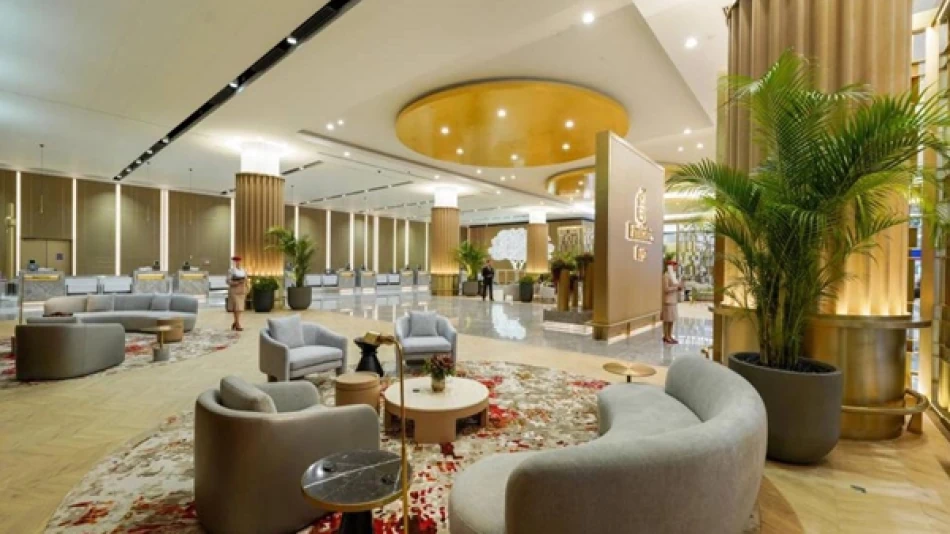
Emirates Unveils Exclusive Travel Experience for First-Class Passengers
Emirates Doubles Down on Ultra-Luxury Travel with Exclusive First-Class Terminal in Dubai
Emirates Airlines has opened a dedicated first-class check-in facility at Dubai International Airport's Terminal 3, marking another strategic move to cement its dominance in the premium aviation market. As the world's largest operator of international first-class flights with 26,800 weekly seats, the Dubai-based carrier is betting that exclusive ground experiences will justify its premium pricing amid intensifying competition from Asian and Middle Eastern rivals.
The Golden Gateway Strategy
The newly unveiled facility features a luxurious golden entrance and private seating areas exclusively for first-class passengers and Skywards Platinum members. This move represents more than cosmetic upgrades—it's a calculated response to changing passenger expectations in the post-pandemic era, where travelers increasingly value privacy, seamless service, and contactless experiences.
Adel Al Redha, Emirates' Executive Vice President and Chief Operating Officer, emphasized the airline's commitment to ground service investments, recognizing that premium passengers "value privacy and comfort." The facility integrates chauffeur services, expedited check-in, and direct access to world-class lounges, creating an end-to-end luxury journey.
Market Positioning in a Competitive Landscape
The Numbers Game
Emirates' claim to operate the world's largest international first-class network isn't just marketing rhetoric—it's a strategic differentiator. With 26,800 weekly first-class seats, the airline has built its business model around capturing the high-yield passenger segment that generates disproportionate revenue per seat mile.
This approach mirrors Singapore Airlines' strategy with its Suites product and private terminals, but Emirates is betting on scale and Dubai's geographic advantage as a global hub connecting East and West.
Regional Competition Intensifies
The timing of this investment is significant. Qatar Airways has been aggressively expanding its QSuite business class product, while Saudi Arabia's new national carrier and the UAE's own Etihad are repositioning themselves in the premium market. Emirates' response is characteristically bold: double down on first-class luxury rather than retreat to business class efficiency.
The Economics of Ultra-Premium Travel
From an investor perspective, Emirates' first-class focus represents both opportunity and risk. Premium cabin passengers typically generate 10-15 times more revenue per seat than economy travelers, making them crucial for airline profitability. However, this strategy requires consistent demand from ultra-high-net-worth individuals and corporate travelers—segments that proved volatile during recent global disruptions.
The dedicated terminal facility also signals Emirates' confidence in Dubai's recovery as a global travel hub, particularly for connecting traffic between Europe, Asia, and Africa.
Beyond the Golden Entrance
This investment reflects broader trends in luxury travel, where experiences increasingly matter more than products. Airlines worldwide are recognizing that the journey begins at the curb, not at the gate. Similar to how American Express has invested in Centurion Lounges to differentiate its premium cards, Emirates is using ground infrastructure to justify its pricing premium.
The facility's integration with chauffeur services and lounge access creates a seamless experience that competitors will struggle to replicate without significant capital investment and operational coordination.
Strategic Implications
Emirates' continued investment in first-class infrastructure suggests the airline sees sustainable demand in the ultra-premium segment, despite broader industry trends toward business class optimization. This positioning could prove prescient if economic recovery continues and business travel rebounds, or it could represent expensive over-investment in a shrinking market segment.
For Dubai's aviation ecosystem, the facility reinforces the emirate's ambitions to remain the world's premier travel hub, competing directly with Singapore, London, and emerging challengers in Saudi Arabia and Qatar.
Most Viewed News

 Layla Al Mansoori
Layla Al Mansoori






